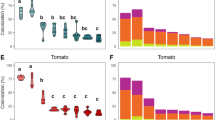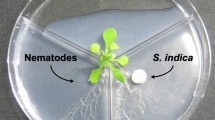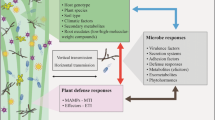Abstract
Coffee (Coffea arabica) is one of the most important tropical crops in the world, and root-knot nematode (Meloidogyne spp.) infections are one of the main factors that negatively affect crop yields throughout the South American region. This study aimed to evaluate the role of indigenous arbuscular mycorrhizal fungi against root-knot nematode infections in coffee plants grown under different soil conditions in the Peruvian Amazon. The experimental design was a 3A × 2B × 4C factorial scheme with 24 treatments. Each experimental unit consisted of six coffee plants, with three replicates in randomized blocks, totaling 18 coffee plants per treatment. The studied factors were soil conditions (A), types of coffee propagation (B), and arbuscular mycorrhizal fungi consortia (C). The data were statistically examined by three-way analysis of variance, and the Tukey HSD test was applied for multiple comparisons of group means. Mycorrhiza-induced tolerance was confirmed against root-knot nematodes, as the severity of infection was significantly lower in mycorrhizal roots, with an average reduction of 52.5%, 38.5% and 38.3% in coffee plants inoculated with Huall-pache, Do-cat, and Mo-cat, respectively. Furthermore, the effects on plant growth and biological control vary depending on the diversity of arbuscular mycorrhizal fungi consortia, soil conditions, and type of propagation. This study therefore demonstrates that the inoculation of coffee plants with indigenous arbuscular mycorrhizal fungi prior to field establishment promotes coffee plant growth after root-knot nematode infections.






Similar content being viewed by others
References
Affokpon A, Coyne DL, Lawouin L, Tossou C, Agbèdè RD, Coosemans J (2011) Effectiveness of native West African arbuscular mycorrhizal fungi in protecting vegetable crops against root-knot nematodes. Biol Fertil Soils 47:207–217. https://doi.org/10.1007/s00374-010-0525-1
Alban R, Guerrero R, Toro M (2013) Interactions between a root knot nematode (Meloidogyne exigua) and arbuscular mycorrhizae in coffee plant development (Coffea arabica). Am J Plant Sci 4:19–23. https://doi.org/10.4236/ajps.2013.47A2003
Andrade SAL, Mazzafera P, Schiavinato MA, Silveira APD (2009) Arbuscular mycorrhizal association in coffee. J Agri Sci 147:105–115. https://doi.org/10.1017/S0021859608008344
Arévalo L, Vallejos-Torres G (2019) Producción de clones de café (Coffea arabica) en la región de San Martín. IIAP, San Martín (in Spanish)
Avelino J, Cristancho M, Georgiou S, Imbach P, Aguilar L, Bornemann G, Läderach P, Anzueto F, Hruska AJ, Morales C (2015) The coffee rust crises in Colombia and Central America (2008-2013): impacts, plausible causes and proposed solutions. Food Sec 7:303–321. https://doi.org/10.1007/s12571-015-0446-9
Bagyaraj DJ (2014) Mycorrhizal fungi. Proc Indian Natn Sci Acad 80:415–428. https://doi.org/10.16943/ptinsa/2014/v80i2/55118
Bainard LD, Klironomos JN, Gordon AM (2011) Arbuscular mycorrhizal fungi in tree-based intercropping systems: a review of their abundance and diversity. Pedobiologia 54:57–61. https://doi.org/10.1016/j.pedobi.2010.11.001
Barberán A, Bates ST, Casamayor EO, Fierer N (2012) Using network analysis to explore co-occurrence patterns in soil microbial communities. The ISME Journal 6:343–351. https://doi.org/10.1038/ismej.2011.119
Berruti A, Lumini E, Balestrini R, Bianciotto V (2016) Arbuscular mycorrhizal fungi as natural biofertilizers: let’s benefit from past successes. Front Microbiol 6:1559. https://doi.org/10.3389/fmicb.2015.01559
Bhale U, Bansode SA, Singh S (2018) Multifactorial role of arbuscular mycorrhizae in agroecosystem. In: Gehlot P, Singh J (eds) Fungi and their role in sustainable development: current perspectives. Springer, Singapore. https://doi.org/10.1007/978-981-13-0393-7
Bowles TM, Barrios-Masias FH, Carlisle EA, Cavagnaro TR, Jackson LE (2016) Effects of arbuscular mycorrhizae on tomato yield, nutrient uptake, water relations, and soil carbon dynamics under deficit irrigation in field conditions. Sci Total Environ 566-567:1223–1234. https://doi.org/10.1016/j.scitotenv.2016.05.178
Carballar S (2009) Variación temporal de la diversidad de hongos de micorriza arbuscular y el potencial micorrízico en especies silvestres de Agave en Oaxaca. Instituto Politécnico Nacional, Oaxaca, MSc Thesis. (in Spanish)
Carneiro RM, Cofcewicz ET (2008) Taxonomy of coffee-parasitic root-knot nematodes, Meloidogyne spp. In: Souza RM (ed) Plant-parasitic nematodes of coffee. Springer, Dordrecht. https://doi.org/10.1007/978-1-4020-8720-2_6
Collange B, Navarrete M, Peyre G, Mateille T, Tchamitchian M (2011) Root-knot nematode (Meloidogyne) management in vegetable crop production: the challenge of an agronomic system analysis. Crop Prot 30:1251–1262. https://doi.org/10.1016/j.cropro.2011.04.016
de Mendiburu F (2020). Agricolae: statistical procedures for agricultural research. R package
dos Anjos ÉCT, Cavalcante UMT, Gonçalves DMC, Pedrosa EMR, dos Santos VF, Maia LC (2010) Interactions between an arbuscular mycorrhizal fungus (Scutellospora heterogama) and the root-knot nematode (Meloidogyne incognita) on sweet passion fruit (Passiflora alata). Braz Arch Biol Technol 53:801–809. https://doi.org/10.1590/s1516-89132010000400008
Gerdemann JW, Nicolson TH (1963) Spores of mycorrhizal endogone species extracted from soil by wet sieving and decanting. Trans Br Mycol Soc 46(2):235–244. https://doi.org/10.1016/s0007-1536(63)80079-0
Harvey CA, Rakotobe ZL, Rao NS, Dave R, Razafimahatratra H, Rabarijohn RH, Rajaofara H, MacKinnon JL (2014) Extreme vulnerability of smallholder farmers to agricultural risks and climate change in Madagascar. Philos Trans R Soc Lond Ser B Biol Sci 369:20130089. https://doi.org/10.1098/rstb.2013.0089
Helgason T, Fitter AH (2009) Natural selection and the evolutionary ecology of the arbuscular mycorrhizal fungi (phylum Glomeromycota). J Exp Bot 60:2465–2480. https://doi.org/10.1093/jxb/erp144
Hol WHG, Cook R (2005) An overview of arbuscular mycorrhizal fungi-nematode interactions. Basic Appl Ecol 6:489–503. https://doi.org/10.1016/j.baae.2005.04.001
INVAM (2017) International culture collection of (vesicular) arbuscular mycorrhizal fungi. West Virginia University, Morgantown http://fungi.invam.wvu.edu/the-fungi/species-descriptions.html, Accessed 15 Oct 2019
Jansa J, Bukovská P, Gryndler M (2013) Mycorrhizal hyphae as ecological niche for highly specialized hypersymbionts - or just soil free-riders? Frontiers Plant Sci 4:134. https://doi.org/10.3389/fpls.2013.00134
Kim SJ, Eo JK, Lee EH, Park H, Eom AH (2017) Effects of arbuscular mycorrhizal fungi and soil conditions on crop plant growth. Mycobiology 45:20–24. https://doi.org/10.5941/MYCO.2017.45.1.20
Lovelock CE, Andersen K, Morton JB (2003) Arbuscular mycorrhizal communities in tropical forests are affected by host tree species and environment. Oecologia 135:268–279. https://doi.org/10.1007/s00442-002-1166-3
Marro N, Lax P, Cabello M, Doucet ME, Becerra AG (2014) Use of the arbuscular mycorrhizal fungus Glomus intraradices as biological control agent of the nematode Nacobbus aberrans parasitizing tomato. Braz Arch Biol Technol 57:668–674. https://doi.org/10.1590/S1516-8913201402200
Moosavi MR, Zare R (2012) Fungi as biological control agents of plant-parasitic nematodes. In: Mérillon JM, Ramawat KG (eds) Plant defence: biological control. Springer, Dordrecht. https://doi.org/10.1007/978-94-007-1933-0
Newman EI (1966) A method of estimating the total length of root in a sample. J Appl Ecol 3:139–145. https://doi.org/10.2307/2401670
Pham Y, Reardon-Smith K, Mushtaq S, Cockfield G (2019) The impact of climate change and variability on coffee production: a systematic review. Clim Chang 156:609–630. https://doi.org/10.1007/s10584-019-02538-y
Phillips JM, Hayman DS (1970) Improved procedures for clearing roots and staining parasitic and vesicular-arbuscular mycorrhizal fungi for rapid assessment of infection. Trans Br Mycol Soc 55:158–161. https://doi.org/10.1016/s0007-1536(70)80110-3
Rojas M, Salazar L (2013) Densidad crítica de Meloydogine exigua en plantas de almácigo de café variedad Caturra. Agronomía Costarricense 37:115–123 (in Spanish)
RStudio Team (2020) RStudio: integrated development for R. Studio, Inc., Boston http://www.rstudio.com/
Schouteden N, De Waele D, Panis B, Vos CM (2015) Arbuscular mycorrhizal fungi for the biocontrol of plant-parasitic nematodes: a review of the mechanisms involved. Front Microbiol 6:1280. https://doi.org/10.3389/fmicb.2015.01280
Sewnet TC, Tuju FA (2013) Arbuscular mycorrhizal fungi associated with shade trees and Coffea arabica L. in a coffee-based agroforestry system in Bonga, Southwestern Ethiopia. Afrika Focus 26:111–131
Sheskin DJ (2000) Handbook of parametric and nonparametric statistical procedures, 2nd edn. Chapman & Hall/CRC, United States of America
Solis R, Gonzales N, Pezo M, Arévalo L, Vallejos-Torres G (2019) Rooting of sacha inchi (Plukenetia volubilis) juvenile cuttings in microtunnels. Acta Agronómica 68:35–40. https://doi.org/10.15446/acag.v68n1.72101
Trouvelot A, Kough J, Gianinazzi-Pearson V (1986) Mesure du taux de mycorhization VA d’un système radiculaire. Recherche de méthodes d’estimation ayant une signification fonctionnelle. In: Gianinazzi-Pearson V, Gianinazzi S (eds) Physiological and genetical aspects of mycorrhizae. INRA Press, Paris
Vaast P, Caswell-Chen EP, Zasoski RJ (1998) Influences of a root-lesion nematode, Pratylenchus coffeae, and two arbuscular mycorrhizal fungi, Acaulospora mellea and Glomus clarum on coffee (Coffee arabica L.). Biol Fertil Soils 26:130–135. https://doi.org/10.1007/s003740050355
Vallejos-Torres G, Arévalo L, Iliquin I, Solis R (2019) Respuesta en campo de clones de café a la inoculación con consorcios de hongos micorrízicos arbusculares en la región Amazonas, Perú. Inf Tecnol 30:73–84. https://doi.org/10.4067/S0718-07642019000600073 (in Spanish)
Vos CM, Tesfahun AN, Panis B, De Waele D, Elsen A (2012) Arbuscular mycorrhizal fungi induce systemic resistance in tomato against the sedentary nematode Meloidogyne incognita and the migratory nematode Pratylenchus penetrans. Appl Soil Ecol 61:1–6. https://doi.org/10.1016/j.apsoil.2012.04.007
Funding
This study was funded by Programa Nacional de Innovación Agraria (PNIA) in the framework of activities of the project “Biofertilización y bioprotección de plantas clonales de café (Coffea arabica) con micorrizas arbusculares en la Región San Martín,” according to Contract No. 23-2015-INIA-PNIA/UPMSI/IE.
Author information
Authors and Affiliations
Contributions
Geomar Vallejos-Torres and Luis A. Arévalo conceived the idea of this paper. Elvis Espinoza and Geomar Vallejos-Torres collected the data. Reynaldo Solis and Jesús Marín-Díaz analyzed and discussed the results. Finally, Geomar Vallejos-Torres, Reynaldo Solis, and Jesús Marín-Díaz contributed to the writing of the final version of the manuscript.
Corresponding author
Ethics declarations
Conflict of Interest
The authors declare that they have no conflicts of interest.
Code Availability
Not applicable.
Additional information
Publisher’s note
Springer Nature remains neutral with regard to jurisdictional claims in published maps and institutional affiliations.
Rights and permissions
About this article
Cite this article
Vallejos-Torres, G., Espinoza, E., Marín-Díaz, J. et al. The Role of Arbuscular Mycorrhizal Fungi Against Root-Knot Nematode Infections in Coffee Plants. J Soil Sci Plant Nutr 21, 364–373 (2021). https://doi.org/10.1007/s42729-020-00366-z
Received:
Accepted:
Published:
Issue Date:
DOI: https://doi.org/10.1007/s42729-020-00366-z




